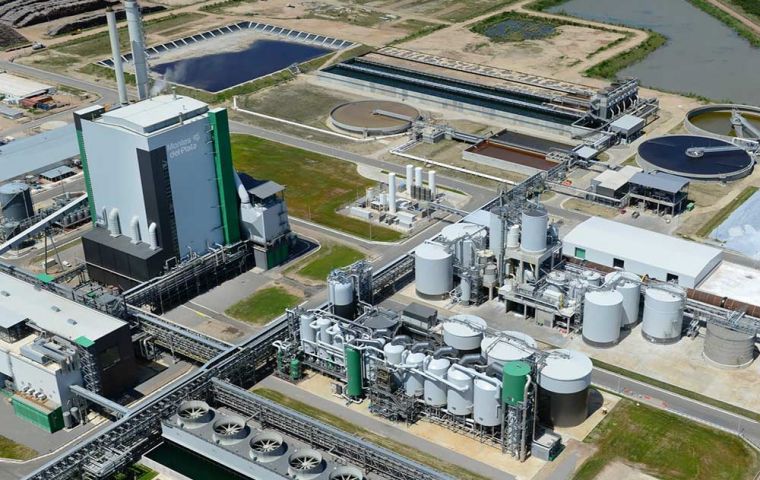MercoPress. South Atlantic News Agency
Political turmoil making Uruguay investment alternative option for Chilean business people
 Chilean companies have invested heavily in Uruguay, Arauco and its Montes del Plata pulp plant, Enjoy, (casinos and hotel), and Sodimac (the Chilean version of Home Depot)
Chilean companies have invested heavily in Uruguay, Arauco and its Montes del Plata pulp plant, Enjoy, (casinos and hotel), and Sodimac (the Chilean version of Home Depot) Uruguay is becoming a growing option for Chilean business people and investors given the political climate and favorable economic scenario of the Mercosur member, while conditions in the Pacific nation are rapidly deteriorating under political stress and adverse conditions for business, according to Santiago economic media.
Although trade relations between Chile and Uruguay have been fluid, particularly in the last twenty years with the arrival of Chilean companies such as the forestry giant Arauco and its Montes del Plata pulp plant, plus Enjoy, (casinos and hotel), and Sodimac (the Chilean version of Home Depot), just to mention a few, the situation in Chile is making investors look for alternative opportunities.
In effect the current constitutional reform process which will be put to a referendum vote next month is causing much uncertainty since Chilean public opinion polls indicate it could be rejected by over ten points, which will definitively further weaken an already fragile ruling coalition.
“In the new constitution some of the pro investment rules which made Chile strong institutionally have been questioned generating an uncertainty the country has not been used to for decades,” admits Manuel Alcalde an expert in tax law and former coordinator of fiscal policy at the Finance ministry.
Likewise a fiscal reform bill sent to Congress early July, which if finally approved would mean a significant change in fiscal rules, “the largest reform in the last four decades, it is ambitious, and aggressive since it targets a revenue of some 4% of Chile's GDP,” explains Alcalde. The bill includes a tax on wealth, which has generated doubts, and apprehension, particularly among the rich, as well higher income tax rates, which do not satisfy middle class contributors.
Likewise if anyone is thinking in avoiding the 5% wealth tax on all assets, by leaving the country or changing fiscal address, it will have to be done now otherwise that person will also have to pay a so called “exit tax”. Another chapter in the reform, alleging Chilean food security allows the country to ignore the relevance of trade treaties.
“It's a too important, deep fiscal package and has many business people thinking about remaining in Chile or looking for alternatives, which will have to be decided before 2024 if the bill is passed, a delicate situation which has retracted investment plans,” points out Alcalde.
He added, “In this context Uruguay is a good place to take savings and plans. They have good communications, a solid financial system, opportunities in real estate, agriculture, forestry and technology...”.
Leading Law and Tax firms in Uruguay admit that there has been a considerable increase of inquiries from potential Chilean investors, but most are still making numbers, “they are still in the search and sound stage”.
However economist Aldo Lema from a Uruguayan consultant office points out that aside from the “economic, political and social contingencies faced by Chile, during recent decades relations between Uruguay and Chile have intensified with Chileans interested in investing in Uruguay”.
“I believe it is part of a process, Chilean corporations have grown overseas, looking for new markets and diversifying risks, and for many of them Uruguay has been the first step, precisely because of its political, social and economic stability, strong independent legal system, plus institutional similarities between the two countries”, points out Lema.
“This is a process that started in the nineties, has increased in the last two decades, and it has been two ways, Uruguayan companies have also established in Chile, but it is also true that Uruguay offers foreign investors economic and fiscal incentives, which has it not only in the horizon of Argentines, as has been traditional, to a certain extent for Brazilians, and now for the Chileans.”





Top Comments
Disclaimer & comment rulesCommenting for this story is now closed.
If you have a Facebook account, become a fan and comment on our Facebook Page!